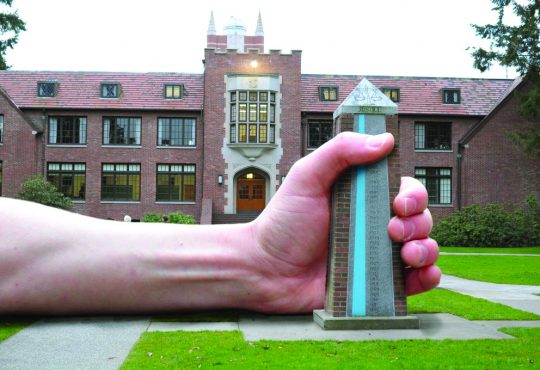Slurred words and blurred lines: Understanding the problem of consent while under the influence
The intersection of alcohol and consent on college campuses is a complicated issue. Many students are undoubtedly consuming alcohol, and a lot of these students are also engaging in sexual activity.
Whether it’s a coincidence or because they feel the need for “liquid courage” in order to initiate a sexual encounter, students are engaging in sex under the influence.
How should a person navigate a situation where both booze and libido are in play? The answer is not immediately obvious, and with good reason. As Bebe La Grua, an officer of the campus club for Women’s InterseXtionality, Empowerment, and Narratives says, “You have to give it a lot of thought.” No two situations are exactly the same.
Let’s begin by thinking about the University’s policy on sexual misconduct, which states that an intoxicated person may not give consent. This policy falls relatively in line with Washington State law both for federal funding reasons and because of genuine concern for the reduction of sexual violence.
Although neither state nor university policies define “intoxication” outright, leaders of the Babeland consent workshop on campus indicated that in the case of the state, the threshold of intoxication is the same as the legal blood alcohol content limit for driving (0.08), and that the University holds that the presence of any alcohol or drugs in the system makes consent impossible.
In other words, engaging in sexual activity under the influence can lead to serious, potentially life-altering consequences, and this is a fact that should always be kept in mind. It is important to acknowledge the possible consequences of your actions, including legal implications, no matter how much your inhibitions are lowered.
According to Khalila Fordham, a pre-doctoral intern with CHWS, the University’s rules “promote a harm reduction model which attempts to minimize the risk of any student…being taken advantage of while under the influence of mind altering substances.” She says that this conforms to sex positive cultural standards that call for all sexual activity to be “safe, sane, and consensual.” Furthermore, she maintains that the university “encourages individuals to appreciate the full mental, physical, and spiritual experience of sex.”
Some argue that the University’s policy is too hardline, and that, as La Grua says, “when you take extremes, you miss the reality of the situation. In our experience, alcohol tends to be part of our sexuality.” While she maintains that a reliance on alcohol to facilitate sexual encounters is, to an extent, unhealthy, and “representative of larger problems of self worth, it’s a legitimate feeling and needs to be addressed as such.”
Several students expressed the sentiment that positive sexual experiences can take place under the influence of drugs and alcohol. Alcohol doesn’t necessarily have to be connected with negative encounters. As one student says, “I believe that I have had consenting but intoxicated hookups. I think individuals…who want to hook up when consuming drugs or alcohol could easily have a conversation about engaging in any sexual activity prior to drinking or doing drugs.” This sort of communication, however, becomes more difficult in the case of one-night-stands, a relatively common occurrence in the college setting.
This brings us to the absolutely imperative topic of communication. In order to make sure that everyone’s needs are being met, both/all members participating in a sexual encounter must be able to enthusiastically, clearly and affirmatively consent, free of coercion and fear of judgment. Silence does not mean consent, and neither does indecisiveness. There should be clear negotiation of boundaries and frequent check-ins. Boundaries can be altered or reversed at any time. If someone says NO to something, their request must be respected.
Additionally, individuals cannot give proper consent if they are not aware of the STD status of all parties involved. Everyone should be aware and in agreement about birth control (if necessary) as well. Proactively requesting consent and fully disclosing personal needs and limits are both helpful elements for effective communication.
Next, it is helpful to think about how to assess levels of intoxication if you do find yourself wanting to have sex under the influence. Alcohol affects everyone differently, and even when a person doesn’t seem drunk, they still might not be able to give adequate consent.
However, if a person is a) slurring their words, b) unable to walk normally, c) acting out of character, d) vomiting, e) unable to focus, f) uncommunicative, g) unconscious, or any combination of these, it is a good indication that they are absolutely not in the right mindset to have sex. Even if the person is not exhibiting these signs but you know they’ve been drinking, ask them how many drinks they’ve had. If they cannot answer definitively, it is probably a good idea to hold off.
Ultimately, consent under the influence is shady at best, and it is impossible to be absolutely sure that a person has the capacity to engage in sane and safe sex while drinking or doing drugs.
First and foremost, respecting your sexual partners and engaging in thoughtful analysis of consent in any given situation are key elements to a positive sexual experience. Again, respect and thoughtfulness are absolutely essential!
Most people involved in promoting sex positivity and reducing sexual violence on campus agree that we need to talk more about consent. Conversations need to be had in which diverse opinions are acknowledged and addressed, and the sex education on campus needs to be re-vamped. We need to see more workshops, classes, talks and panels that help individuals determine for themselves how to have positive, respectful sex.
Maybe if we start talking more openly about sex in general, we won’t have to be so afraid to have sex sober and the ethics of non-sober sex will become clearer.
In the meantime, there are resources on campus for those who want to discuss questions surrounding sex.
CHWS staff is frequently available and very knowledgeable, and Khalila Fordham is always looking for input on how we can revolutionize our sex-positivity and education on campus. You can email her directly with your ideas at kfordham@pugetsound.edu.
Peer Allies is a support network of students on campus that provides a safe space for survivors of sexual violence during weekly “office hours.” More information can be found on their “Peer Allies” Facebook page.
The Sexuality, Issues, Relationship, and Gender Education (SIRGE) Coordinator is another good link between students and the administration for issues having to do with sex and consent. They can be reached at sirge@pugetsound.edu.
WIXEN and De-Masc are both campus clubs that provide a space for women and men, respectively, to talk about issues of sex, gender and intersectionality. Their contact information can be found on the ASUPS website.






